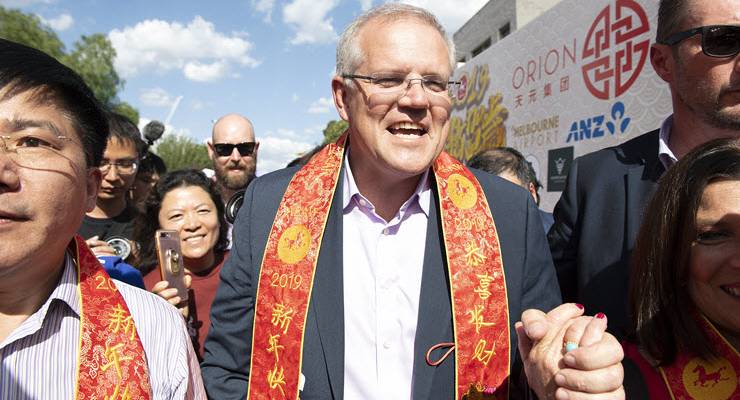
Senior Australian political figures can curse the American president as often as they please without fearing Trump will halt shipments of Australian beef or tell Amazon to stop dealing with Australian customers. Yet it appears few of our political leaders dare utter a harsh word about China’s president, or speak frankly about the serious challenges that country presents to Australia for fear of the consequences.
As a result, the public conversation is at risk of becoming skewed. As prime minister Turnbull could mock President Trump in public and yet back-bencher Andrew Hastie is taken to task for speaking frankly about China.
By any normal measure it should not be too difficult for the governments of Australia and China to get along. Our national economies are basically complementary, our people-to-people ties are dense and fruitful, and for all our security concerns the two countries are hardly strategic competitors. And yet things have gone badly awry.
Was it something we said?
Some think so. Speaking at the Lowy Institute in Sydney in June, Kevin Rudd blasted Malcolm Turnbull for undermining relations by “opening his big mouth”. What Turnbull did to warrant this blast was echo a phrase often attributed to Mao Zedong while he was introducing legislation in 2017 to counter foreign government interference in Australia. “And so we say,” Turnbull announced before reverting to Mandarin, “Aodaliya renmin zhanqilai — the Australian people stand up.”
According to Rudd, this statement was the tipping point in the relationship. “You want to pick the day when the relationship went — in my judgment, unnecessarily — down the gurgler? It was that day,” Rudd told the Lowy crowd.
Oddly enough, Rudd’s critics made similar claims about something he said himself a decade earlier, in April 2008, which riled authorities in Beijing. Delivering a speech in fluent Mandarin at Peking University during a period of acute sensitivity ahead of the Olympics, Rudd spoke as a “zhengyou” (critical friend) who was keen to admonish China over its human rights record in Tibet. For the remainder of his China visit, Rudd was shunned by the country’s senior leadership and on his return home he found Australia relegated to China’s sin bin for over a year.
In fact Turnbull and Rudd each raised serious concerns that deserved a public hearing… but both spoke in Mandarin. One of the standard rules in the diplomat’s training manual is stick to your own language. Could there be a lesson for Prime Minister Morrison here? Speak up, but stick to English.
The Chinese Communist Party is more than usually protective about what anyone says in China’s national language. The party assumes that it owns the language and, as presumptive owner, that it has the right to police anything said or published in the language anywhere on earth.
Some idea of the party’s sensitivity around language can be gleaned from rules governing use of the word for China (Zhongguo). Within China no private entity or independent organisation — no business, agency, charity, sporting code, professional association or organisation whatsoever — can call itself “China-this” or “Chinese-that” unless it is a formal part of the Communist Party’s institutional apparatus. The name of the country is a party brand.
This practice escalates through the system. So, as a general rule, the names of cities and provinces belong to the local party apparatus too. An Australian equivalent would be for the Commonwealth government to reserve the use of “Australia” for itself and Sydney City Council to claim ownership of the word “Sydney”. There would be no Australian newspaper or Sydney Morning Herald. No AFL either. That’s how China works under a party that insists on owning and ruling virtually everything, including the national language.
The party is far less sensitive about what is said in other peoples’ languages. Even within China it raises no objection to people branding an organisation “Chinese” or “China” in English.
There are lessons here. We can take it for granted that any Australian government decision or public statement in English that Beijing finds unpalatable is unlikely to go down well with officials in China. This is largely because of the content conveyed, not the words conveying it. If something needs saying then it needs to be said.
A second lesson is this: brief courtesy words aside, Australian leaders should avoid speaking or publishing in that country’s national language in all public communications in formal or semi-formal settings. But they should be firm and confident in speaking English, Australia’s national language, to talk frankly about all foreign leaders and powers, equally.








No worries, mate. We’ve made that one very easy.
Language? How about recognising the cost of us not learning other languages? Domination of the Chinese language media in Australia by PRC organisations is a well-established fact, made much, much easier by the wilful neglect – devaluation – of languages teaching in the education system. It is entirely reversible – but freeing Budget funds to feed the greed of the filthy rich comes a long way before protecting democracy.
There is no meaningful governmental funding or support to promote fluency in any Asian language. Such negligence has several costs. One, being more ignorant of China we are both more ignorant of the consequences of becoming biased towards it, and less able to survive the conflicts of siding with the U.S. Two, we of non-Asian stock could be walking past headlines reading “Morrison To Sell Australia To China Tomorrow”, and we wouldn’t know. That ignorance certainly helps to create a separate society – not because they don’t know our language but because they can effectively exclude us because we don’t know their language. But then, perhaps the Chinese donations to the Liberal Party are partly to ensure its’ inaction.
What matters more than the PRC spying on us is the increasingly brazen PRC success in controlling Chinese in Australia. That is a greater threat to our national security – and our national self-respect – than spying or indeed the buying of local politicians.
morrison et al promote patriotism while doing the opposite. “We” apply extraordinary brutality to the unfortunate asylum-seekers in our concentration camps, but when Chinese students bully their Australian university lecturers for not adopting the PRC position, or aggressively protest at Australia not doing so, our asylum-seeker-bashing politicians all hide in a closet, all gutless wonders together.
Well written and argued. Can’t begin to understand why it was blocked until now just as my comment below was blocked up to now. BTW, Professor Fitzgerald has been aware of and concerned about these issues for several years now, as can be seen by his contributions to the Interpreter and the Lowry Institute. He is a national treasure and should not be confused with the many other Fitzgeralds floating about.
https://www.lowyinstitute.org/the-interpreter/loyalty-through-links-and-control-long-history-chinese-diaspora-diplomacy
The only thing Scummo will criticise is the idea that you need more than 40 bucks a day to live and that wages need to be liveable and that we need to know what he is up to. A worthless, spineless fake Christian hypocrite. And that is more praise than he warrants
I have to disagree with with you here, OGO. In the last couple of weeks he has braved the ferocity of both the Public Service Management and the Pacific Islanders. What a pity he didn’t get the Captain Cook reception he so richly deserves.
I’d be less concerned about the utterances of pollies if I had the slightest confidence that their blatherings were evidence based.
To date, there is precious little evidence of that.
Will my comment be awaiting moderation for much longer? Does me raising the issue increase the likelihood of it being deleted?
Just because a site is run by progressive people doesn’t mean that commenters can expect any great tolerance. “The Conversation” for instance bars commenters for life and all national franchises for a first “offence”. No appeal mechanism at “the Guardian”, either.
Though these sites are very good to have, it does underline the seldom-mentioned point that commenters have no rights; we have only the capacity to comment that the individual site gives us. Without pointing to any particular site, and generally speaking, we deserve more respect than that.
Agree.
I’ve had the occasional success wresting a disappeared comment from the Grauniad – in the past, though not lately – but they also use volunteer moderators which I think is interesting but many are not only poorly read, they brook no dissent.
Crikey does at least answer queries privately, sometimes.
I have long advocated that our tags be shown when something has been censored, as in the Graun.
I’d even suggest that ‘waiting’ to be flagged so that casual readers can realise the regime exerted.